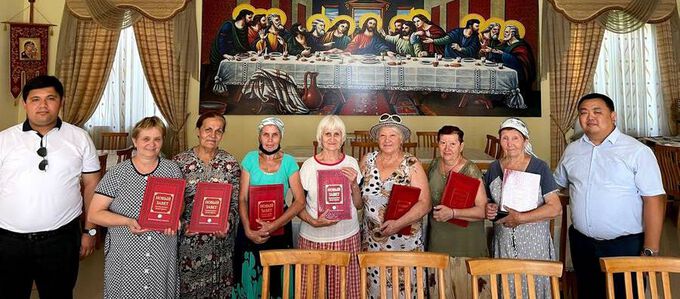
Bringing the word of God to the people? That goes beyond the altar too. But at times the two go hand in hand—like in Uzbekistan, where a New Apostolic Priest is currently directing the affairs of the national Bible society.
Having a Bible in your own language? For Uzbek Christians that is anything but a given. And there are two very simple reasons for this.
For one thing, the very possession of Bibles is heavily regulated in the Central Asian country: a household can only possess a single Bible. And the owner must be at least 18 years of age.
In addition, the Bible must be in one’s own language. And the Bible has only existed in the Uzbek language since 2017. It was with the support of the international umbrella organisation known as the “United Bible Societies” (UBS), that the Uzbek Bible Society managed to accomplish this feat.
Risen from the ruins
As early as 1880 in today’s capital city of Tashkent there was already a warehouse filled with Bibles and other books for all of Central Asia and published in some 300 languages. However, this warehouse had to be surrendered with the dawn of Soviet rule in 1918. The current Bible Society was founded at the end of November 1992 and registered with the state just under a year later.
Since 2011, the New Apostolic Church has also been represented on the board of directors, which is headed by the president, his deputy, and the general secretary as managing directors. The New Apostolic Priest Alexander Kim (at right in the photo), who has been active in the management group since 2016, was elected to the latter position.
When the Iron Curtain fell
Uzbekistan is home to over 100 different ethnicities. Of the country’s approximately 34 million citizens, some 90 percent are Muslim, while only two percent are Christian. “Christians are allowed to practise their faith within the framework of state laws,” explains the New Apostolic Church of Berlin-Brandenburg, which serves our members in Uzbekistan in both an organisational and a pastoral capacity.
The Church currently numbers some 900 members in four congregations, who are served by ten local ministers. The Regional Church was established in the former Soviet Republic when the Iron Curtain fell at the start of the 1990s. After some initial information evenings, it was possible to establish congregations in Buchara, Navoi, Smarkand, and Tashkent.
Too expensive to buy
The cohesion among the believers is very strong due to the predominantly Islamic environment, explains the Church’s website. “Depending on the financial possibilities, cross-congregational gatherings are organised. However, these are becoming rarer because the cost of living in Uzbekistan has recently risen significantly.”
This also has an effect on the demand for Bibles: if you wanted to buy a copy, you would have to pay about the same amount of money that a family has to earn in order to heat their home in winter. It is for this reason that the Bible Society usually distributes the sacred books free of charge.
An audio version of the Uzbek Bible is currently in the works—not least of all because the spoken word is highly esteemed in traditional local culture.




